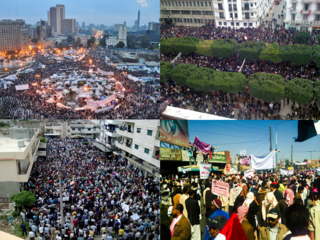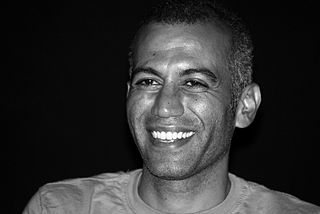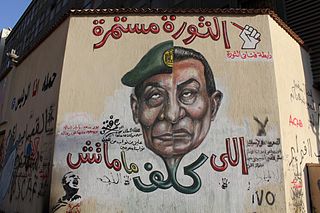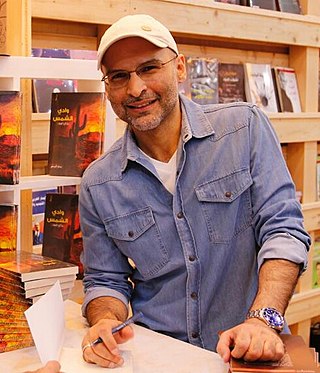Related Research Articles
Adel Iskandar is a British-born Middle East media scholar, postcolonial theorist, analyst, and academic. He is currently an Associate Professor of Global Communication at Simon Fraser University in Canada. The author and co-author of several works on Arabic language media, Iskandar's work has contributed both to the political economy of communication and the cultural impact of media. His most prominent works deal with analyses of the Arabic satellite station Al Jazeera, digital dissidence, global communication theory, and decolonization.

The Tribes of Arabia or Arab tribes denote ethnic Arab tribes originating in the Arabian Peninsula. These tribes trace their ancestry to one of the two Arab forefathers, Adnan or Qahtan.
The History of Republican Egypt spans the period of modern Egyptian history from the Egyptian Revolution of 1952 to the present day, which saw the toppling of the monarchy of Egypt and Sudan, the establishment of a presidential republic, and a period of profound economic, and political change in Egypt, and throughout the Arab world. The abolition of a monarchy and aristocracy viewed widely as sympathetic to Western interests, particularly since the ousting of Khedive Isma'il Pasha, over seven decades earlier, helped strengthen the authentically Egyptian character of the republic in the eyes of its supporters.
The Arab Commission for Human Rights is an Arab world non-governmental human rights organisation that was founded in 1998.

The Arab Spring or the First Arab Spring was a series of anti-government protests, uprisings and armed rebellions that spread across much of the Arab world in the early 2010s. It began in Tunisia in response to corruption and economic stagnation. From Tunisia, the protests then spread to five other countries: Libya, Egypt, Yemen, Syria and Bahrain. Rulers were deposed or major uprisings and social violence occurred including riots, civil wars, or insurgencies. Sustained street demonstrations took place in Morocco, Iraq, Algeria, Lebanon, Jordan, Kuwait, Oman and Sudan. Minor protests took place in Djibouti, Mauritania, Palestine, Saudi Arabia and the Moroccan-occupied Western Sahara. A major slogan of the demonstrators in the Arab world is ash-shaʻb yurīd isqāṭ an-niẓām!.

The Egyptian Crisis was a period that started with the Egyptian revolution of 2011 and ended with the installation of a counterrevolutionary regime under the presidency of Abdel Fattah el-Sisi in 2014. It was a tumultuous three years of political and social unrest, characterized by mass protests, a series of popular elections, deadly clashes, and military reinforcement. The events have had a lasting effect on the country's current course, its political system and its society.

Hossam el-Hamalawy is an Egyptian journalist, blogger, photographer and socialist activist. He is a member of the Revolutionary Socialists and the Center for Socialist Studies.

Mohamed Mohamed Morsi Eissa al-Ayyat was an Egyptian politician, engineer, and professor who served as the fifth president of Egypt, from 2012 to 2013, when General Abdel Fattah el-Sisi removed him from office in a coup d'état after protests in June. An Islamist affiliated with the Muslim Brotherhood organization, Morsi led the Freedom and Justice Party from 2011 to 2012.
Mohamed Salah El Azab is an Egyptian writer and novelist.
The Local Coordination Committees of Syria are a network of local groups that organise and report on protests as part of the Syrian uprising. In June 2011, the network was described by The New York Times as beginning to "emerge as a pivotal force" in Syria. As of August 2011, the network supported civil disobedience and opposed local armed resistance and international military intervention as methods of opposing the Syrian government.
Haytham Manna (al-Awdat) is a Syrian writer; he spent three decades as a human rights activist who helped create and became spokesperson for the Arab Commission for Human Rights (ACHR). In 2011, during the early stages of the Syrian civil war, he resigned as spokesperson of the ACHR and helped create and become spokesperson of the National Coordination Committee for Democratic Change (NCC), one of the two main opposition groups active in the uprising that became a civil war. Manna lives in Paris. In 2015, he was elected co-chairperson of the Syrian Democratic Council, a newly founded umbrella organisation of secular, democratic, non-Islamist opposition in Syria.
Following the 2011 Egyptian revolution, the Muslim Brotherhood in Egypt became one of the main forces contending for political power in Egypt against the Supreme Council of the Armed Forces (SCAF) and other established centers of the former Hosni Mubarak regime.

Mohamed Mahmoud Graffiti is a collection of graffiti that was painted on several walls in and surrounding Mohamed Mahmoud street near Tahrir Square in Cairo, Egypt during and after the 2011 Egyptian revolution.
On the morning of 8 July 2013 at the Republican Guard headquarters in Cairo, Egypt there was a clash between protesters seeking the return of deposed President Mohamed Morsi, and the military, who were protecting the institution. According to the Forensic Medical Authority, at least 61 protesters seeking the return of Morsi to power were killed and more than 435 injured in the clashes, in what has been deemed a massacre by the Muslim Brotherhood and those opposed to the recent coup d'état. Amnesty International has condemned the military's disproportionate use of force, with a spokesperson stating, "Even if some protesters used violence, the response was disproportionate and led to the loss of life and injury among peaceful protesters."
Conspiracy theories are a prevalent feature of Arab politics, according to a 1994 paper in the journal Political Psychology. Prof. Matthew Gray writes they "are a common and popular phenomenon" that are important to understanding the political landscape of the Arab world. Variants include conspiracies involving Western colonialism, Islamic anti-Semitism, anti-Zionism, superpowers, oil, and the war on terror, which is often referred to in Arab media as a "War against Islam". Roger Cohen theorizes that the popularity of conspiracy theories in the Arab world is "the ultimate refuge of the powerless." The prevalence of conspiracy theories reflects effective top-down dissemination of disinformation by state actors, rather than a unique susceptibility of Arab culture to conspiracy, as some have claimed. State hostility and weak protections for journalists present major obstacles to challenging conspiracy theories, as journalists struggle to gather information and put their lives at risk by contradicting their governments. The spread of antisemitic and anti-Zionist conspiracism in the Arab world and the Middle East has seen an extraordinary proliferation since the beginning of the Internet Era.

Tora Prison is an Egyptian prison complex for criminal and political detainees, located in Tora, Egypt. The complex is situated in front of the Tora El Balad metro station. The main buildings in the Tora Prison complex are Tora Agricultural Prison, Tora Liman, Tora Istiqbal (reception), Tora El Mahkoum and Tora Supermax prison, also known as Scorpion Prison.
AbdelRahman Mansour is an internet activist, journalist and human rights defender. In 2011, he came up with the idea of turning Egypt's National Police Day on 25 January into a Facebook event, "Revolution of the Egyptian People", sparking the online campaign for pro-democracy demonstrations that later snowballed into a popular uprising.

Essam El-Haddad is an Egyptian politician. He was a senior advisor for foreign relations for the Muslim Brotherhood in Egypt and the Freedom and Justice Party. In August 2012, he was appointed as one of four Egyptian Presidential assistants with responsibility for foreign relations and international cooperation until the overthrow of Egyptian president Mohamed Morsi in the third of July 2013. He is now in custody in solitary confinement in Al-Aqrab Prison in Cairo.

Bassam Almusallam is a Kuwaiti award-winning novelist, short story writer, and former assistant editor at KUNA. He has published three books including two short story collections, Under the Pigeons Tower (2010) and The Banner: Stories in The Windward (2013) which won Laila al-Othman Prize in the same year. His short story, Adham Washing Machine, won a competition organized by Al-Arabi magazine and the London-based BBC Arabic in 2012.
References
- 1 2 3 4 5 6 7 8 9 Muller, Nat; Kholeif, Omar (Autumn 2012). "Reviews and Critique: Jadaliyya". Portal 9. Archived from the original on 2012-12-16. Retrieved 2012-11-29.
- ↑ جدلية, Jadaliyya-. "Jadaliyya". Jadaliyya - جدلية. Retrieved 2021-12-11.
- 1 2 Antoun, Naira (2012-11-02). "Documenting hope: Jadaliyya publishes collection on Arab uprisings". Al-masry Al-youm (English Edition) . Retrieved 2012-11-02.
- 1 2 3 Lindsey, Ursula (2014-09-29). "Arab-Studies E-Zine Hopes to Counter Mainstream Narrative". The Chronicle of Higher Education . Retrieved 2014-09-29.
- ↑ "Arab Studies Institute". Arab Studies Institute. Retrieved 2011-12-21.
- ↑ "Faculty and Staff: Bassam S. Haddad". George Mason University . Retrieved 2012-12-01.
- ↑ "Jadaliyya Turns One". Jadaliyya.com. Retrieved 2011-12-21.
- ↑ Haddad, Bassam (2013-05-15). "Jadaliyya: A New Form of Producing and Presenting Knowledge in/of the Middle East (Interview by Julia Elyachar)". Cultural Anthropology: Journal for the Society of Cultural Anthropology . Retrieved 2013-07-27.
- ↑ Hamid, Shadi (2012-08-20). "Egypt's Uncomfortable Challenge: Balancing Security and Civil Liberties". The Atlantic . Retrieved 2012-08-21.
- ↑ The Editors (2011-11-29). "Who's Who in Egypt's Election". Christian Science Monitor . Retrieved 2012-01-29.
{{cite news}}:|last=has generic name (help) - ↑ DeSantis, Nick (2012-10-31). "Dean at U. of Jordan Is Reportedly Removed Over Sexual-Harassment Video". The Chronicle of Higher Education . Retrieved 2012-10-31.
- ↑ The Editors (2011-12-09). "Syria: Homs massacre warning - Friday 9 December 2011". The Guardian . Retrieved 2011-12-21.
{{cite news}}:|last=has generic name (help) - 1 2 The Editors (2011-12-02). "Syria, Egypt and Middle East unrest - Friday 2 December". The Guardian. Retrieved 2011-12-21.
{{cite news}}:|last=has generic name (help) - ↑ Greenwald, Greg (2012-12-26). "Obama's gift to al-Qaida, support for tyranny, and FBI monitoring of dissent". The Guardian. Retrieved 2012-12-27.
- ↑ Hitchon, Joe (2013-04-13). "High Stakes for Engaging Morsi's Egypt". Inter Press Service . Retrieved 2012-08-21.
- ↑ "Egitto, così Morsi "il polipo" prepara il referendum sulla nuova costituzione". La Stampa. 2012-12-09. Retrieved 2012-12-10.
- ↑ The Editors (2011-12-04). "Khoury on Syria". London Review of Books . Retrieved 2011-12-21.
{{cite magazine}}:|last=has generic name (help) - ↑ Mackey, Robert (2012-01-18). "Taking to the Streets of Cairo, Wielding Video Projectors". The New York Times . Retrieved 2012-03-23.
- ↑ Goodman, David (2012-05-15). "Rappers Do Not Delight in Morocco and Iran". The New York Times. Retrieved 2012-05-15.
- ↑ Mackey, Robert (2012-09-29). "Iranian News Agency Plagiarizes The Onion". The New York Times. Retrieved 2012-09-29.
- ↑ "Egyptian Judges Break Ranks to Support Morsi Vote Request". The New York Times. 2012-12-03. Retrieved 2012-04-14.
- ↑ Mackey, Robert (2012-12-11). "Evidence of Torture by Egyptian Islamists". The New York Times. Retrieved 2012-12-12.
- ↑ Memmott, Mark (2011-12-02). "Egyptian Elections: 62 Percent Turnout". NPR . Retrieved 2011-12-21.
- ↑ "Frontline: Revolution in Cairo-Day to Day Timeline: Jan. 31". PBS. 2011-01-31. Retrieved 2011-12-21.
- ↑ "Frontline: Revolution in Cairo-Day to Day Timeline: Feb. 1". PBS. 2011-02-01. Retrieved 2011-12-21.
- ↑ LAGENDIJK, JOOST (2012-01-03). "No responsibility to protect in Syria?". Today's Zaman . Archived from the original on 2012-01-03. Retrieved 2012-01-03.
- ↑ The Editors (2012-06-12). "Political chaos as Egypt chooses a new president". AFP. Archived from the original on 2013-01-16. Retrieved 2012-06-12.
{{cite web}}:|last=has generic name (help) - ↑ The Editors (2011-09-21). "Al-Jazeera Interview with Jadaliyya Co-Editor Noura Erakat on PLO/PA Strategy at the UN". Jadaliyya/Al Jazeera English . Retrieved 2011-12-21.
{{cite web}}:|last=has generic name (help) - ↑ The Editors (2013-03-30). "Listening Post - Media mea culpas and the Iraq war". Al Jazeera English . Retrieved 2013-04-13.
{{cite web}}:|last=has generic name (help) - ↑ The Editors (2011-12-07). "BBC Interview with Jadaliyya Co-Editor Bassam Haddad on Asad's ABC Interview". Jadaliyya/BBC. Retrieved 2011-12-21.
{{cite web}}:|last=has generic name (help) - ↑ "Studio interview: Egyptians vote on constitution". China Central Television. 2012-12-16. Retrieved 2012-12-16.
- ↑ "2012-11-21 Palestine seeking statehood in the UN". China Radio International. 2012-11-21. Archived from the original on July 12, 2014. Retrieved 2012-11-23.
- ↑ Dow, Nicole (2012-05-16). "Syrian outcome could alter its neighbors' future". CNN. Retrieved 2012-05-16.
- ↑ "Democracy Now! Interview with Jadaliyya Co-Editor Mouin Rabbani on Palestinian Statehood Bid". Jadaliyya/Democracy Now!. 2011-09-23. Retrieved 2011-12-21.
- ↑ The Editors (2013-03-15). "Quadriga - Invasion Anniversary - Iraq's Lost Decade?". Deutsche Welle . Retrieved 2013-04-13.
{{cite web}}:|last=has generic name (help) - ↑ Carrión, Francisco (2012-08-14). "Las rivalidades dentro del Ejército consolidan el poder de Mursi en Egipto". El Mundo . Retrieved 2012-08-16.
- ↑ Black, Ian (2012-11-23). "Egyptian president Mohamed Morsi proves a deft, adroit and ruthless leader". The Guardian. Retrieved 2012-11-23.
- ↑ Mayault, Isabelle (2012-08-13). "L'Égypte s'interroge après le coup de force de Morsi". Le Figaro . Retrieved 2012-08-16.
- ↑ "MSNBC Up With Chris Hayes: Israel and Gaza". MSNBC. November 2012. Archived from the original on 2012-07-18. Retrieved 2012-11-23.
- ↑ "On Defections and Developments in Syria: PBS NewsHour Interview with Bassam Haddad and David Lesch". Jadaliyya/PBS NewsHour. 2012-08-07. Retrieved 2012-08-07.
- ↑ "CrossTalk: Gaza Reprieve". Russia Today. 2012-11-23. Retrieved 2012-11-23.
- ↑ Bradley, Matt (2012-08-13). "Egypt's New Top General Has U.S. Ties". The Wall Street Journal . Retrieved 2012-08-13.
- ↑ Sullivan, Kevin (2012-12-03). "In Saudi Arabia, unemployment and booming population drive growing poverty". The Washington Post . Retrieved 2012-12-03.
- ↑ Idilbi, Salma (2012-01-31). "How could those who left Syria call on those inside to embrace death?". The Guardian . Retrieved 2012-01-31.
- ↑ "Jadaliyya". Courrier International. 2012-11-02. Retrieved 2011-02-04.
- ↑ Bali, Asli; Abu-Rish, Ziad; et al. (2011-03-20). "The drawbacks of intervention in Libya" . Retrieved 2011-12-21.
- ↑ Hajjar, Lisa (2011-02-07). "Suleiman: The CIA's man in Cairo". Al Jazeera English . Retrieved 2011-12-21.
- ↑ Al-Khalsan, Mohamed (2011-12-24). "The army and the economy in Egypt". Egypt Independent. Retrieved 2011-12-24.
- ↑ Al Qassemi, Sultan (2012-02-03). "Tribalism in the Arabian Peninsula: It's A Family Affair". Al Arabiya . Retrieved 2012-02-06.
- ↑ Aouragh, Miriyam (2011-02-07). "Na Oslo: Europa, de islam en de normalisering van het racisme, Door Miriyam Aouragh & Richard Seymour". Eutopian Institute. Retrieved 2011-12-21.
- ↑ Sallam, Hisham (2012-11-24). "Mursi y la nacionalización de la Revolución: algunas reflexiones iniciales". Rebelion. Retrieved 2013-04-13.
- 1 2 3 4 "Pluto Press Books, Middle East Studies - The Dawn of the Arab Uprisings: End of an Old Order?". Pluto Press . Retrieved 2012-08-14.
- ↑ "Macmillan: Pluto Press Books - The Dawn of the Arab Uprisings: End of an Old Order?". Palgrave Macmillan . Retrieved 2012-08-14.
- ↑ "Jadaliyya's First Book is Now Available from Pluto Press". Jadaliyya. Retrieved 2012-10-23.
- ↑ "Pluto Press Books marketing - The Dawn of the Arab Uprisings: End of an Old Order?" (PDF). Pluto Press . Retrieved 2012-08-15.